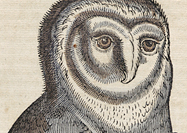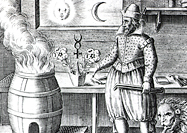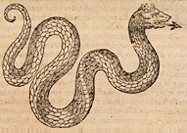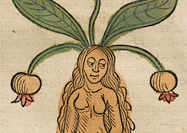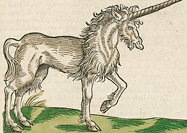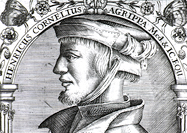EXPLORE
Select one of the topics from above.
Introduction
Magic comprises the most profound contemplation of the most secret things, their nature, power, quality, substance, and virtues, as well as the knowledge of their whole nature.
German occultist Heinrich Cornelius Agrippa von Nettesheim, 1533In 1997, British author J. K. Rowling introduced the world to Harry Potter and a literary phenomenon was born.
Although a fantasy story, the Harry Potter book series features magic that is based partially on Renaissance traditions that played an important role in the development of Western science, including alchemy, astrology, and natural philosophy.
Incorporating the work of several 15th- and 16th-century thinkers, the series examines ethical topics such as the desire for knowledge, the effects of prejudice, and the responsibility that comes with power.
Explore the collections of the National Library of Medicine and discover Harry Potter’s world and its roots in Renaissance magic, science, and medicine.
Continue to Introduction
Potions
…do not forget to pray to God to bestow on thee the understanding of the reason of the truth of nature…
French alchemist Nicolas Flamel, 1806Harry Potter and the Philosopher’s Stone (published in the United States as Harry Potter and the Sorcerer’s Stone) follows Harry to the Hogwarts School of Witchcraft. While there, the young wizard uncovers the villainous Lord Voldemort’s plot to steal the Philosopher’s Stone, which historical thinkers believed was able to turn all metals to gold and produce an elixir of eternal life.
Still weakened by his failed attempt to kill Harry ten years earlier, Voldemort hopes that the Stone will help him resurrect his violent reign over wizards, humans, and magical creatures. Harry thwarts Voldemort’s plan by possessing the magically-protected Stone first, simply by having no intention to use the Stone for personal gain.
Even in his earliest adventure, Harry chooses the outcome that helps others despite the risks to his own life.
Continue to Potions
Monsters
I heard that on the edge of Germany near Styria, many flying four-legged serpents resembling lizards appeared, winged, with an incurable bite…
Swiss naturalist and physician Konrad Gesner, 1551At Hogwarts School of Witchcraft, Harry Potter learns magic spells, charms, and potions. He is taught about the natural world and its uses. This knowledge helps Harry and his friends survive adventures and defeat the villainous Lord Voldemort.
Armed with information about the basilisk, Harry knows to avoid its fatal stare and to use its highly venomous fangs to destroy fragments of Voldemort’s soul. When Harry encounters a dragon in the Triwizard Tournament, he knows from his studies to have respect for the creature, which guarantees the young wizard’s survival.
Although they consider dragons dangerous creatures, wizards have created nature reserves with specialized caregivers to ensure the creatures can thrive without harming people. Dragons also have valuable magical traits—various parts are commonly used in potions and their heartstrings often compose the magical core of wands.
Continue to Monsters
Herbology
I have noticed a relationship between science and natural philosophy…those writings interest me the most which deal with minerals, plants, and animals.
Swiss naturalist and physician Konrad Gesner, 1551Because plants and their uses are important to wizards, all students at Hogwarts School of Witchcraft and Wizardry are required to take Herbology.
Harry Potter learns how to grow mandrakes, real plants studied by historical botanists. Although this isn’t his favorite subject, the young wizard soon comes to appreciate Herbology. Harry discovers that mandrake is the key ingredient of a potion that will cure his injured classmates.
Harry is reminded of the value of studying plants when he finds a way to breathe underwater during the Triwizard Tournament. A classmate teaches Harry about gillyweed, a fictitious plant that, when ingested, gives its user fins and gills.
Continue to Herbology
Magical Creatures
All things that we use on earth let us use them for good and not for evil.
Swiss-German physician and alchemist Paracelsus, 1533Although the wizards of Harry Potter value learning and teaching about the world around them, they do not always respect the creatures in it.
Unicorns are considered sacred and pure creatures that should be used in magic without harming the animal. The evil Lord Voldemort disregards such warnings and cruelly slaughters several for their magical life-giving blood, exposing his disregard for the natural world.
Merpeople and centaurs, known in the series as “half-breeds,” are forced to live on segregated lands and are subject to laws about which they have no say.
Several of Harry’s mentors are bothered by the inequalities forced on these beings and feel that wizards could benefit by learning about many different magical cultures. Hogwarts’ headmaster, Albus Dumbledore, employs Firenze, a centaur, to teach Divination, where students learn about reading the future. For many of the young witches and wizards, Professor Firenze is the first centaur they have seen.
Continue to Magical Creatures
Immortality
Magic comprises the most profound contemplation of the most secret things, their nature, power, quality, substance, and virtues, as well as the knowledge of their whole nature.
German occultist Heinrich Cornelius Agrippa von Nettesheim, 1533Throughout the novel series, Harry Potter makes crucial decisions about the fate of all living things as he attempts to thwart the villainous Lord Voldemort’s quest for a racially-pure wizard state, ultimate power, and eternal life. Although Harry struggles with fear of becoming an evil wizard like Voldemort, he is reminded by friends and mentors that his compassionate and unselfish use of magic sets the two apart. Time and again, the young wizard appreciates all the natural world has to offer, develops friendships with ostracized creatures and racially “impure” wizards, and uses his power to help others, even at the risk of his own life. Harry’s desire to do what is right helps him to defeat Lord Voldemort, keeping all the young wizard loves safe from harm.
Continue to Immortality


